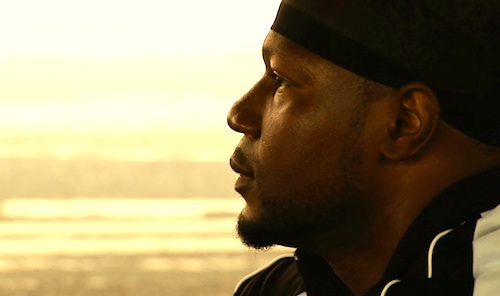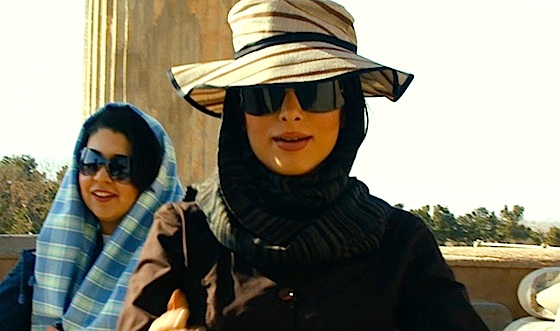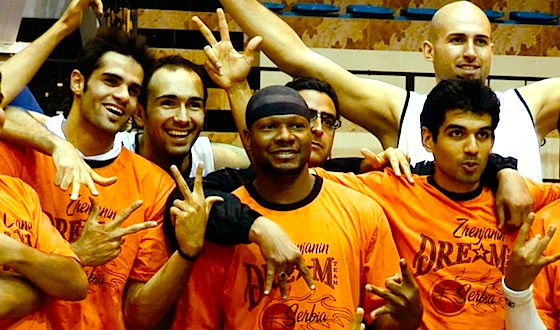[Editor’s Note: the post below appears today at The Huffington Post and at AOL-Moviefone.]
By Jason Apuzzo & Govindini Murty. NBA fans know that two-time MVP point guard Steve Nash recently joined the Los Angeles Lakers. Fans are buzzing, because the addition of Nash could soon result in a return to championship glory for the league’s most glamorous franchise. As big as Nash’s impact on the Lakers might be, however, it can’t possibly match the impact that flashy point guard Kevin Sheppard — the former Jacksonville University star and Virgin Islands native — had in 2008 on A.S. Shiraz, a professional basketball team in Iran’s Super League.
The reasons for this go beyond sports, however, because over the course of one gripping and emotional season — a season documented by director Till Schauder and producer Sara Nodjoumi in their extraordinary new documentary, The Iran Job — Sheppard becomes one of Iran’s most popular athletes, and brings a ray of hope into an increasingly repressive and isolated society.
The Iran Job screened last week in Washington, D.C., and had its world premiere recently at the Los Angeles Film Festival, where we had the chance to talk to the film’s creators.

As depicted in the film, Kevin Sheppard’s Iranian odyssey begins in the fall of 2008, when he’s offered a spot on A.S. Shiraz’s roster. Having already played professional basketball in South America, Europe, China and Israel, the voluble Sheppard is unfazed by the prospect of playing overseas — but is understandably nervous as an American traveling to Iran. Coming in the midst of a 2008 election in which Barack Obama, Hillary Clinton and John McCain all had sharp words for Iran and its nuclear program, Sheppard nonetheless decides to take the plunge out of a spirit of professionalism.
It was a decision that would change his life, as well as the lives of everyday Iranians — and in particular, those of three young Iranian women.
One of the most compelling aspects of The Iran Job is the way it captures the casual details of life in today’s Iran — a closed society that clearly harbors some unusual stereotypes about the outside world. So for example, the moment Sheppard arrives in Iran and meets up with his Serbian roommate (the team’s 7-foot center, and the only other non-Iranian allowed on the squad), Sheppard learns that his cable TV has been custom-provided with hundreds of pornographic channels — the assumption being that because he is an American, he must be sex-obsessed. The irony that such programming is even available in a “strict” Islamic society, of course, is not lost on Sheppard — who can’t help but laugh at Iranian officialdom’s awkward notions of diplomatic courtesy.
Such ticklish moments aside, however, Sheppard immediately begins bonding with average Iranians. A natural show-off with a wicked sense of humor, Sheppard dazzles everyone around him — even when they barely speak English, and are only able to respond to his warm smile and playfulness. The camera follows him early on as he goes out to grab dinner, and we see regular Iranians high-fiving him and snapping pictures with him before he’s even picked up a basketball. His enthusiasm and dynamic personality ignite smiles everywhere.
We asked Sheppard about the rock-star treatment he received from average Iranians:
“The funny thing about it is, once I got over there — people really love America. The government would say, ‘Down with America.’ They have all kinds of signs — ‘America is the Devil,’ ‘Down with the U.S.A.’ — but once you get to the people, they love American culture, they know everything about America, they love all the American sports. So it was a little bit ironic and crazy for me at first. I was like, how can you have all these signs around? But yet, when you speak to the people it’s totally different. So I know it [hostility toward America] was not coming from the mass of the people in general. This was all pushed upon them by the government.”
As The Iran Job proceeds, however, Sheppard’s innate enthusiasm is challenged by his lackluster basketball team, A.S. Shiraz a new and untested squad in Iran’s Super League, and a team sorely lacking in the kind of talent or winning attitude to which Sheppard is accustomed. Viewers basically get the sense that Sheppard has just joined The Bad News Bears of Iranian basketball, and his first task will be to shake up the underwhelming squad.
It’s worth noting here that The Iran Job follows the usual parameters of sports documentaries in depicting how one inspirational player can turn the fortunes of a franchise around by getting his teammates to believe they can win. That’s precisely what Sheppard does, due in part to his on-court heroics (we watch him win several games with buzzer-beating shots), but mostly due to his cocky swagger and high standards. The intense, demanding point guard simply hates to lose — and refuses to let his teammates ever be comfortable accepting defeat.
More important things are happening off the court, however. As Kevin plays his first few games — lighting up the scoreboard and exciting fans with his brash, aggressive style (he plays like a toned-down version of the Clippers’ Chris Paul) — we watch as three young Iranian women named Elaheh, Laleh and Hilda become his biggest fans. All of the women are educated professionals and avid basketball enthusiasts, and they become a kind of chaste, chatty cadre of groupies — spending their evenings hanging out unsupervised (and therefore at no small risk from Iran’s morality police) at Kevin’s apartment, mostly discussing politics and their professional aspirations. The three friends clearly feel comfortable around Kevin, and pour out to him their frustrations with Iranian society — especially in terms of its restrictions against women.
This is where The Iran Job becomes considerably more than a sports documentary, giving viewers a sense of the agonizing difficulties currently facing women under strict Islamic rule. Elaheh, Laleh and Hilda show remarkable candor and courage speaking in front of the camera about their grievances with Iran’s regime, and viewers can’t help but wonder why women of such warmth, intelligence and accomplishment (Elaheh is a savvy event planner, Laleh is getting her master’s degree, and Hilda is a physiotherapist) should have any limitations put on their aspirations at all.

The stylish Elaheh, incidentally, is quite the looker — she bears a striking resemblance to Kim Kardashian — and develops a full-on crush for Sheppard. Adding poignancy to the situation is that Sheppard already has a girlfriend back home in the Virgin Islands, and that Elaheh’s own parents are eager to marry her off to an Iranian of their choosing — a fate she resists. With so many complications, Elaheh contents herself with inviting Sheppard to her family’s home for dinner, and otherwise with taking him for impromptu tours of her city. Her emotional need for him, however, is written all over her face, and probably the most touching aspect of The Iran Job is Elaheh’s unrequited passion — a passion that every aspect of Iranian society seems to frustrate. Indeed, we learn that women in Iran can’t even sit near men at basketball games, and at one point during the film women are even banned from attending games, altogether.
[SPOILER ALERT: Two of the three women — Elaheh and Laleh — eventually make major decisions affecting their fates, with Elaheh rejecting her arranged marriage and moving out of her family home, and Laleh becoming actively involved in the Iranian revolution, leading to her being arrested several times; and one has the sense that these decisions were motivated at least in part by their friendship with Sheppard.]
We asked Sheppard about his unusual relationship with Elaheh, Laleh and Hilda, his biggest fans in Iran:
“The young ladies — I stay in touch with them a lot, because they were making the biggest push in the revolution. Women, in general, have it so hard in Iran. And ironically, they are probably the smartest people over there. They were so educated. I mean, I had 15 guys on my team, and only two guys spoke English. Yet all the women I talked to knew English, French and Farsi. […] They were really highly educated. But because of their [Iran’s] system and the government, they were really restrained in terms of reaching their full potential. So that was really heartbreaking for me.”
The Iran Job builds to its suspenseful climax as two things happen simultaneously: Sheppard unexpectedly leads his team into the Super League playoffs and a showdown with the heavily-favored team from Tehran, and Iran itself moves toward the fateful 2009 election and the attempted Green Revolution. While trying to lead his overmatched team through the playoffs, Sheppard winds up literally having a front-row seat for the mass protests accompanying the election (Sheppard’s Tehran hotel room gave him a dramatic view of the protests, with the front lines between the protesters and the regime’s armed militias literally at his front door) — and it’s at this point that his balancing act as an unofficial American sports ambassador becomes most complicated. The bonds that Sheppard has formed by this point with his teammates and with average Iranians make it impossible for him to view the revolution dispassionately; at the same time, his official job in Iran is simply to play basketball.
And so as Sheppard’s popularity grows — creating awkwardness for the Iranian regime — he becomes something of a silent icon for Iranians, a quiet witness to the possibility of freedom.
As Sheppard explained to us, the experience was life-changing:
“I could not help but get emotionally involved with the people, seeing what they’re going through … they just draw me in, and it made me a much more rounded and humble person, once I got there and saw what was really happening. Because the people over there really want change. The government has their view, but the people have their view, also.”
“A couple of the guys [on his team] came to me and said, ‘you don’t just make us play, you kind of give us hope.’ So you really get emotional.”

As a film, The Iran Job has two major assets going for it: a fantastic musical score made up of contemporary Iranian hip-hop music, and the charismatic personality of Kevin Sheppard himself. Sheppard exhibits major star power, investing vitality, insight and humor into otherwise tense situations. Director Till Schauder and editor David Teague wisely keep Sheppard at the center of events, rarely straying away from him to make general political points about the situation in Iran — and the film is more effective for doing so. Although nominally a sports documentary, The Iran Job is really a penetrating look at how life is currently lived by average Iranians torn between their aspirations for freedom and a repressive, moralistic regime.
The film’s German director, Till Schauder, who was blacklisted from entering Iran after making the film, is hopeful that Iranian society is on the cusp of change:
“It reminds me a little bit of Germany, just before The Wall came down. The measures [associated with holding power] became more and more absurd, so I think it’s a matter of time. My biggest hope, as much as it’s possible in a country like Iran, is that there’s a peaceful transition. […] It’s inevitable at some point that there will be change. Hopefully they will figure this out in a halfway civilized and non-violent way.”
A film not to be missed by either sports fans or those interested in the current situation in Iran, The Iran Job screens at The Noor Iranian Film Festival in Beverly Hills on August 5, and is eyeing a late September/early October release.
As for Kevin Sheppard, he recently retired from professional basketball after finishing his third season in Iran’s Super League. He now runs a not-for-profit youth league, Choices Basketball Associations, which provides a positive environment for kids of the U.S. Virgin Islands through after-school programs and basketball.
Sheppard is reflective about his experience in Iran as a sports ambassador: “Sports transcends politics. That’s why I think sports have a very powerful role in bringing people together.”
Posted on July 17th, 2012 at 2:42pm.